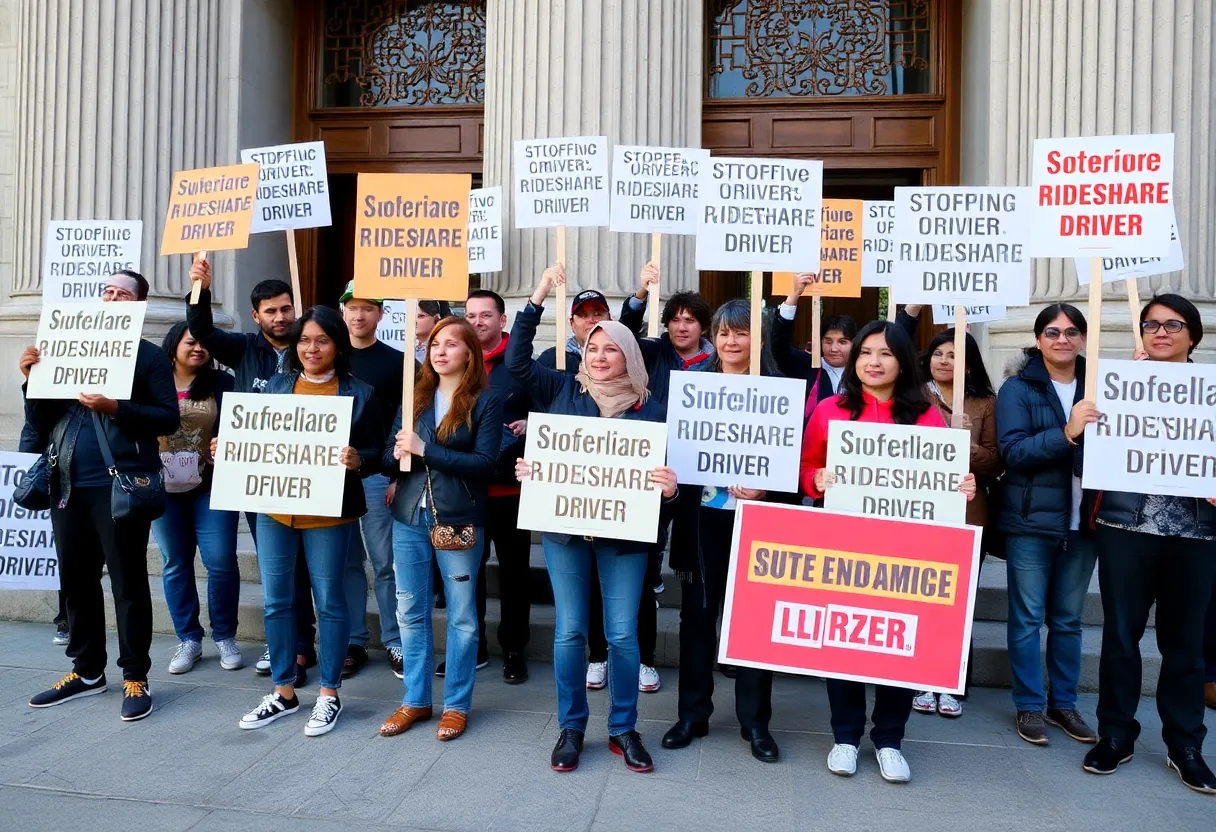California, August 30, 2025
News Summary
California has moved to empower rideshare drivers with new collective bargaining rights through the passage of Assembly Bill 1340. This legislation allows about 800,000 drivers to unionize under a framework supported by Uber and Lyft, marking a significant milestone in the gig economy. Alongside Senate Bill 371, which reduces insurance costs for rideshare companies, this agreement seeks to improve conditions for drivers while maintaining their status as independent contractors under Proposition 22. Experts remain cautious about the potential impact, but many hope for positive change.
California has taken a significant step towards empowering rideshare drivers by paving the way for unionization under a new legislative agreement between Uber Technologies Inc. and Lyft Inc. The deal, which has received support from legislative leaders and California Governor Gavin Newsom, enables California drivers to unionize and collectively bargain for their rights and benefits, honing in on a critical issue in the gig economy.
The landmark agreement involves the passage of Assembly Bill 1340 (AB 1340), a driver bargaining bill sponsored by the Service Employees International Union (SEIU). It is poised to create a structure that allows approximately 800,000 drivers to organize themselves within this new legislative framework. This agreement marks what officials have described as “the largest expansion of private sector collective bargaining in California history.”
In addition to AB 1340, the agreement includes Senate Bill 371 (SB 371), which aims to lower the insurance costs for rideshare companies by reducing the uninsured motorist coverage from $1 million to $60,000 per driver, and $300,000 per accident. Uber has expressed that insurance costs currently consume a substantial portion—up to 45%—of fares in large metropolitan areas such as Los Angeles. By supporting this bill, the companies hope to make rideshare services more affordable for consumers.
Despite changes to bargaining rights, AB 1340 does not alter the classification of gig drivers as independent contractors, a status solidified by Proposition 22 in 2020. This means that while drivers can now negotiate pay and job protections, they will still operate under the protections available for independent contractors, which includes the right to choose to unionize through a petition supported by at least 10% of active drivers.
This legislative move attempts to resolve a longstanding conflict between labor unions and technology companies regarding independent contractors’ rights. Ongoing discussions continue about the classification, compensation, and job protections of ride-hail drivers, as courts and legislatures tackle these issues in an evolving regulatory landscape.
Despite the potential benefits that this collective bargaining framework could offer, experts have expressed skepticism regarding the substantive improvements it may provide for drivers. Notably, this legislative deal does not extend protections to other gig workers, such as those delivering food through apps like DoorDash. Activist drivers remain hopeful, however, that the new framework will equip them with a more robust platform for voicing their grievances and concerns.
As part of the deal’s framework, the anticipated support from state legislators is expected to expedite the proposed bills through the California legislature by mid-September. If successful, this model could potentially set a precedent for similar agreements regarding gig worker rights in other states, responding to the nationwide conversation on the treatment of gig workers and labor standards within the rapidly evolving digital economy.
Key Provisions of the Legislation
- AB 1340: Allows for the unionization and collective bargaining of California rideshare drivers.
- SB 371: Cuts the uninsured motorist insurance requirement significantly.
- Independent Contractor Status: Drivers remain classified as independent contractors under state law, following Proposition 22.
- Driver Participation: Drivers can organize if at least 10% of active drivers support a unionization petition.
Conclusion
California’s agreement between Uber and Lyft marks a turning point for rideshare drivers, introducing a framework for collective bargaining that could reshape the gig economy in a significant way. The path forward remains complex, as the implications of the new legislation will unfold, and drivers navigate their rights within this evolving landscape.
Frequently Asked Questions
What is Assembly Bill 1340?
How many drivers are affected by this legislation?
Will drivers still be classified as independent contractors?
Does this agreement apply to other gig workers?
Key Features of the Legislation
| Feature | Description |
|---|---|
| Unionization Rights | Allows rideshare drivers to collectively bargain for their pay, job protections, and benefits. |
| Insurance Reduction | Reduces uninsured motorist coverage requirements from $1 million to $60,000. |
| Independent Contractor Status | Maintains legal status of drivers as independent contractors under state law. |
| Driver Participation for Unionization | Drivers require support from at least 10% of active drivers to initiate a union. |
Deeper Dive: News & Info About This Topic
- Los Angeles Times
- Wikipedia: Gig economy
- Politico
- Google Search: Gig worker rights
- TechCrunch
- Google Scholar: Uber Lyft unionization
- San Francisco Chronicle
- Encyclopedia Britannica: Collective bargaining
- SFist
- Google News: California rideshare drivers unionization

Author: STAFF HERE COSTA MESA WRITER
The COSTA MESA STAFF WRITER represents the experienced team at HERECostaMesa.com, your go-to source for actionable local news and information in Costa Mesa, Orange County, and beyond. Specializing in "news you can use," we cover essential topics like product reviews for personal and business needs, local business directories, politics, real estate trends, neighborhood insights, and state news affecting the area—with deep expertise drawn from years of dedicated reporting and strong community input, including local press releases and business updates. We deliver top reporting on high-value events such as the OC Fair, Concerts in the Park, and Fish Fry. Our coverage extends to key organizations like the Costa Mesa Chamber of Commerce and Boys & Girls Clubs of Central Orange Coast, plus leading businesses in retail, fashion, and technology that power the local economy such as Vans, Experian, and South Coast Plaza. As part of the broader HERE network, including HEREAnaheim.com, HEREBeverlyHills.com, HERECoronado.com, HEREHollywood.com, HEREHuntingtonBeach.com, HERELongBeach.com, HERELosAngeles.com, HEREMissionViejo.com, HERESanDiego.com, and HERESantaAna.com, we provide comprehensive, credible insights into California's dynamic landscape.


